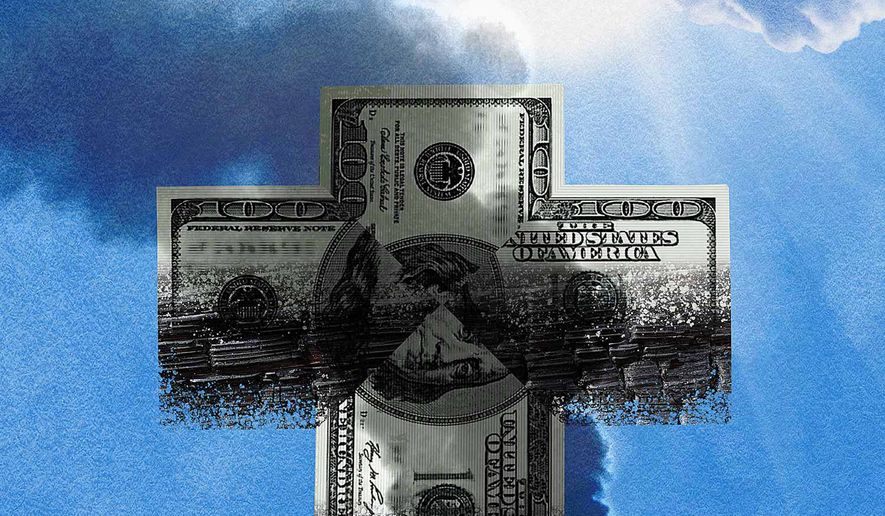OPINION:
Those of us who take religion seriously cling to our faith communities, seeking the solace and lucidity we need to stay sane in a world that seems more and more insane all the time.
Parishes, prayer groups, apostolates and other pious affiliations provide encouragement to keep soldiering on, doing the work of faith, until common sense can reassert itself in the world, or the Lord returns, whichever occurs first.
The recent revelations about the aberrant sexual antics of Cardinal Theodore McCarrick and those allegations against scores of Pennsylvania priests — along with the apparently willful ignorance by which so many in the church hierarchy have avoided doing anything about it all — knock the wind out of believers already disheartened by earlier clerical misconduct and episcopal malfeasance.
Some commentators see a silver lining in these scandals and the pressure put on the American bishops. There will be a house cleaning, they assure us. It’s unavoidable, because the faithful are incensed. People are demanding change, and they’re backing those demands with threats to withhold financial support from their dioceses. In fact, a grass-roots movement along just those lines is spreading rapidly across the country.
There are risks in this approach, of course. It’s one thing to protest the inaction of bishops (and to criticize the opulent lifestyles of some, in contrast to the humility we’d like to see in Christian leaders). It’s another thing to deny church institutions the resources on which they depend to provide vital human services. Efforts at fraternal correction of the powerful could end up harming the innocent and vulnerable.
We’re hearing demands for several bishops to resign. And it’s possible some could be ousted. But then, who would replace them? In a time when the pope has been less than clear in his interpretation of traditional Catholic moral principles — and especially now that a retired high-ranking Vatican official has charged that Francis knew about Cardinal McCarrick yet did nothing — how can we be confident that any new leaders appointed will be reliable?
There’s much talk that lay commissions must take the lead in the cleanup process. But who will staff these groups? How will we balance their makeup — between the traditionalists and the reform-minded, the pre-Vaticanites and the post-Vaticanites?
Then too, as the laity assert themselves more actively, what are the implications for the organizational unity of the church? If things come to torches and pitchforks in the streets, can the hierarchical scheme of Catholic governance even survive in the form we’ve known? Or will lay pressure begin to push the church in the direction of more congregational (Protestant-like) arrangements? Will bishops continue to be bishops? If not, what does that bode for the consistent defense of traditional Catholic moral principles?
There are plenty of good priests and bishops — the majority of them, I can assert with confidence. And some are speaking out. We need to pray for these men: That they rise to the moment, demonstrate their sincere willingness to work in properly balanced partnership with the laity, answer the need for transparency and decisive action.
Also that they show courage. Honest clerics face real risks, from inside the church where entrenched interests remain (there are still shady characters who feel the need to provide cover or to have it provided for themselves). There are risks from outside as well. A Byzantine priest in Indiana was recently attacked by someone who imagined himself the avenger of young sexual victims. He shouted “This is for all the kids,” as he fled.
We are called to be patient, to keep up our spirits, to trust in God’s providence. We’re also called to be prudent, not letting ourselves become swept away by ill-considered actions that might do more damage in the long run. At the same time, we can’t close ourselves off from the possibility of change. If a house cleaning is indeed coming, then any purge of tainted bishops and sexually compromised priests will only intensify the vocations crisis.
The long-debated question of allowing priests to marry will likely reassert itself. Some people will point to the Personal Ordinariate of the Chair of St. Peter, that group of married Anglican clergy permitted entry into the Catholic priesthood by Benedict XVI, as a model. And of course, there are the Eastern Rite Catholic Churches, which have always accepted married priests.
Granted, having wives and children creates complications. The Eastern and Ordinariate priests can attest to that, I’m sure. But there’s no question that permitting marriage more broadly would pump up the numbers, and it would definitely alter the character of priesthood. Men struggling with same-sex attraction could no longer assume that the church is a good place to hide out from their persistent inner conflicts.
Whatever turn things take, Catholics have no alternative but to stand by the faith. The Gospel reading for a recent Sunday (John 6:60-69) spells out our situation. After a large chunk of His followers have turned away from Him, Jesus asks the apostles, “Do you also want to leave?” Simon Peter responds, “Master, to whom shall we go? You have the words of eternal life.”
At this moment in time, what alternative do we have to the faith — the madness of the secular world? That doesn’t seem like a better option. At any rate, Jesus assured us the gates of hell would not prevail against his church. Even though Satan has been receiving quite a bit of help from some people on the inside, trusting in the Lord’s promise is still our best bet.
• A priest of the Diocese of Camden, New Jersey, Rev. Michael P. Orsi currently serves as parochial vicar at St. Agnes Parish in Naples, Florida.




Please read our comment policy before commenting.